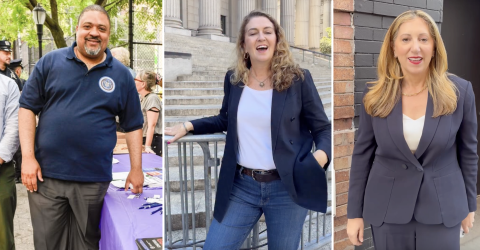Incumbent D.A., Democrat Alvin L. Bragg, Jr., is running for reelection, and is being challenged by Republican Maud Maron, and Independent Diana Florence. Straus News reached out to them in the days before the early voting got underway. (Florence’s answers didn’t make our print deadline, but we’ll add online if they do arrive.)
Why are you the most qualified candidate to become Manhattan D.A.?
Bragg: As a son of Harlem and a prosecutor for more than two decades, I bring both the personal and professional experience needed to lead this office.
When I took office as District Attorney, New York City—like nearly every city—was still reeling from the COVID-19 crime spike. We got to work delivering both safety and fairness, because we know we can’t have one without the other.
We are achieving these goals with a targeted strategy focusing on the drivers of violence, addressing the underlying needs of those who commit crimes, and investing in preventative measures, all of which will keep our communities safe today and in the long term.
We’ve helped bring down shootings by 66 percent, invested in mental health services to get people the help they need and reduce recidivism; gotten justice for survivors of sexual assault, hate crimes, and wage theft; taken on tenant harassment and political corruption; and more than doubled immediate help for victims of crimes.
Maron: With over 20 years as a trial attorney and public defender in Manhattan and the Bronx, I’ve defended the vulnerable while training the next generation of lawyers at Cardozo Law School and the Legal Aid Society. As a New Yorker, mom of four, and former president of Manhattan’s largest NYC Community Education Council, I understand the real-world impacts of crime on families and communities. Unlike Alvin Bragg’s ideological experiments, I’ll prioritize victims, enforce laws equally, and restore trust in our justice system through common-sense prosecution. My litigation experience equips me to lead with accountability, not leniency—making me the tough, fair advocate Manhattan needs.
There’s still a lot of work ahead, but we’ve made the justice system fairer, held the powerful to account, and every day we’re making Manhattan safer.
The D.A. is a powerful but not an omnipotent position. What changes—or non-changes (such as the NYPD gang database)—to state and city law would further the causes of justice and public safety?
Maron: As D.A., I’ll collaborate closely with the NYPD to rebuild partnerships, but we need legislative fixes to Albany’s failed reforms. Albany must reform the 2019 bail laws to end the “revolving door” for recidivists—allowing judges to detain violent offenders without cash bail for serious crimes—while preserving discretion for low-level cases. Legislatures need to do more to fix discovery rules that dismiss cases on technicalities. On the NYPD gang database: No changes—protect it as a vital tool for tracking criminal networks and reducing gun violence, with oversight to ensure accuracy. Advocate mandatory mental health treatment for street-homeless threats and keep Rikers open to avoid neighborhood jails. These steps will deter crime, support victims, and enhance safety without overreach.
Bragg: Last session, we worked with the other NYC D.A.s and a coalition of business and advocacy groups to reform our Discovery laws—preventing thousands of cases from being dismissed on technicalities.
We’ve also led efforts to expand the list of hate-crime-eligible charges, make the manufacture of 3D-printed guns and parts illegal, and eliminate the statute of limitations for sex trafficking.
We also championed the Support Act, ensuring a continuum of care for people living with serious mental illness who are returning to our communities after being found unfit to stand trial. It defies logic that our laws once required hundreds of individuals deemed unfit for trial to have their cases dismissed and be released without the tools or treatment they need.
While the public—and press—tends to focus on violent crimes, from “forcible touching” in the subways to much worse, what role(s) does the D.A. play in the realm of financial crime, especially the many scams targeting seniors.
Bragg: We created the Office’s first-ever Worker Protection Unit to investigate and prosecute wage theft, employee harassment, and workplace exploitation across Manhattan’s diverse industries.
We also launched the Housing and Tenant Protection Unit to combat illegal evictions, unsafe living conditions, and abuse of government programs by landlords and developers.
Our office has cracked down on public corruption and held accountable those who line their pockets at the expense of workers and clients. We’re also aggressively pursuing scams that target seniors—through education, prevention, and vigorous enforcement.
Maron: The D.A. plays a crucial role in prosecuting financial crimes that devastate lives, especially for vulnerable seniors facing isolation and fixed incomes. I’ll dedicate a specialized unit to elder fraud, targeting scams like investment schemes, romance cons, tech support ruses, and government impersonations that stole billions last year. By partnering with AARP, senior centers, and banks for prevention education, we’ll empower victims to report early. Prosecute aggressively: Seek restitution, asset forfeiture, and long sentences for repeat offenders, while training ADAs on digital forensics to trace cryptocurrency trails. Unlike Bragg’s focus on leniency, my office will treat these “invisible” crimes as seriously as violent ones—holding fraudsters accountable to protect our elders’ dignity and security.

